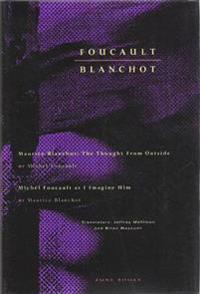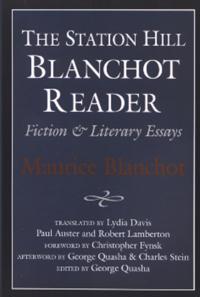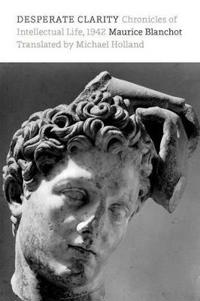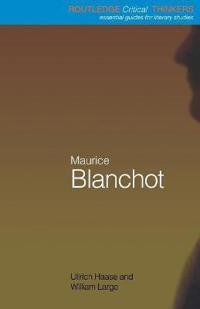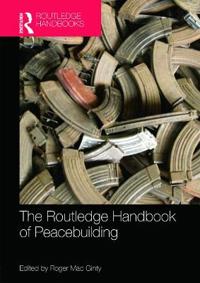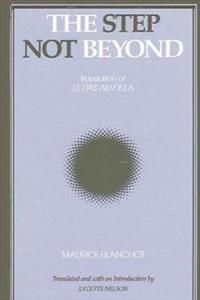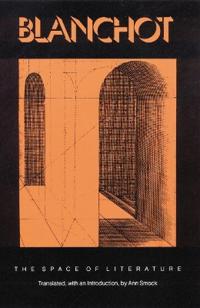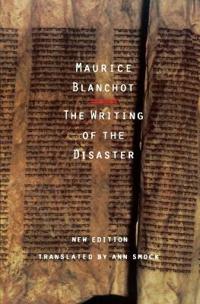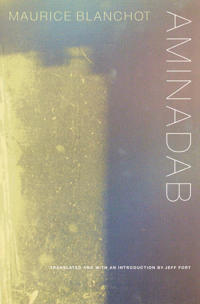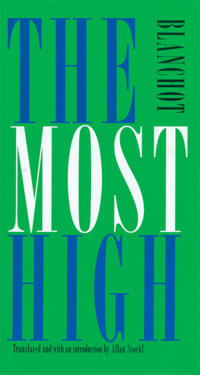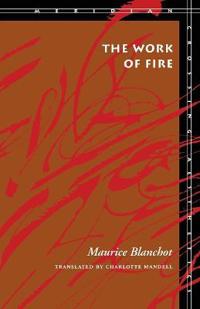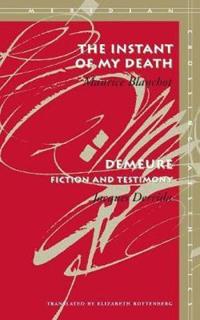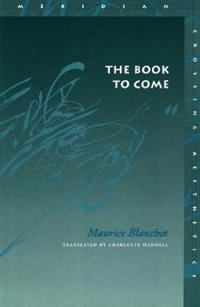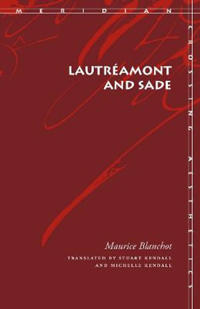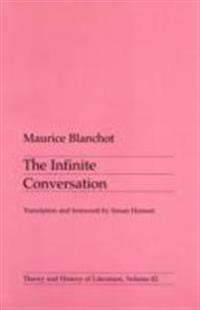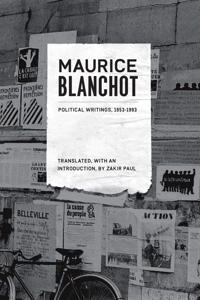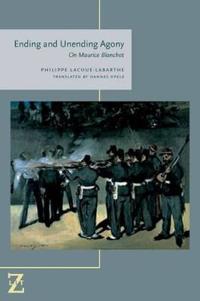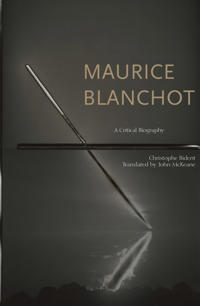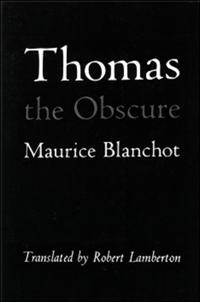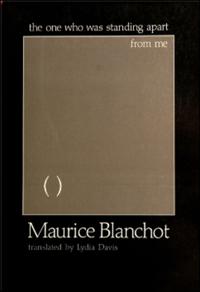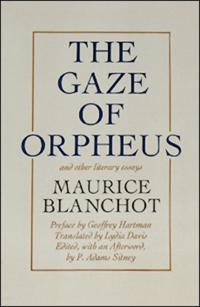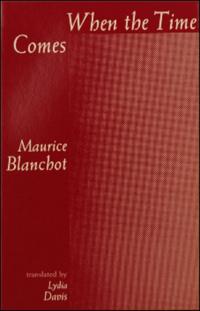Foucault, Blanchot (Häftad)
avMichel Foucault, Maurice Blanchot
ISBN: 9780942299038 - UTGIVEN: 199001Essays by two prominent French writers analyze each other's writings and intellectual works
Desperate Clarity (Pocket)
avMaurice Blanchot, Michael (TRN) Holland, Maurice Blanchot
ISBN: 9780823251001 - UTGIVEN: 2013-11These articles gradually outline a practical project that both looks back to the radical artistic doctrines of the late nineteenth and early twentieth centuries and anticipates the most original developments in the postwar era, among writers such as Robbe-Grillet, Butor, Sarraute, and Duras, not to [...]
Maurice Blanchot
ISBN: 9780415125963 - UTGIVEN: 1996-05This timely collection of essays is the first to be written on the work of Maurice Blanchot in English. One of the finest writers of our time, Blanchot is a contemporary of Bataille and Levinas; his writing has influenced the likes of Derrida and Foucault. Eminent commentators featured here include[...]
Maurice Blanchot
ISBN: 9780415234955 - UTGIVEN: 2001-04Without Maurice Blanchot, literary theory as we know it today would have been unthinkable. Jacques Derrida, Paul de Man, Michel Foucault, Roland Barthes, Gilles Deleuze: all are key theorists crucially influenced by Blanchot's work. This accessible guide: * works 'idea by idea' through Blanchot's w[...]
Maurice Blanchot (Häftad)
avUllrich Haase, William Large
ISBN: 9780415234962 - UTGIVEN: 200102Jacques Derrida, Paul de Man, Michel Foucault, Roland Barthes, Gilles Deleuze - all are theorists crucially influenced by Blanchot's work. This guide examines Blanchot's work on an idea-by-idea basis,anchoring each in historical and intellectual contexts; examines Blanchot's understanding of literat[...]
Routledge Handbook of Peacebuilding (Inbunden)
avMaurice Blanchot
ISBN: 9780415690195 - UTGIVEN: 201301This new Routledge Handbook offers a comprehensive, state-of-the-art overview of the meanings and uses of the term 'peacebuilding', and presents cutting-edge debates on the practices conducted in the name of peacebuilding. The term 'peacebuilding' has had remarkable staying power. Other terms, such [...]
Maurice Blanchot (Häftad)
ISBN: 9780801881992 - UTGIVEN: 2005-05As a novelist, essayist, critic, and theorist, Maurice Blanchot has earned tributes from authors as diverse as Jacques Derrida, Giles Deleuze, and Emmanuel Levinas. But their praise has told us little about what Blanchot's work actually says and why it has been so influential. In the first comprehen[...]
The Space of Literature (Häftad)
avMaurice Blanchot
ISBN: 9780803260924 - UTGIVEN: 198206Maurice Blanchot, the eminent literary and cultural critic, has had a vast influence on contemporary French writers - among them are Jean Paul Sartre and Jacques Derrida. From the 1930s through the present day, his writings have been shaping the international literary consciousness. "The Space of Li[...]
The Writing of the Disaster (Häftad)
avMaurice Blanchot
ISBN: 9780803261204 - UTGIVEN: 198606Modern history is haunted by the disasters of the century - world wars, concentration camps, Hiroshima, and the Holocaust - grief, anger, terror, and loss beyond words, but still close, still impending. How can we write or think about disaster when by its very nature it defies speech and compels sil[...]
Aminadab (Pocket)
avMaurice Blanchot, Jeff (TRN) Fort, Jeff (INT) Fort
ISBN: 9780803261761 - UTGIVEN: 2002-04The world of Aminadab, Maurice Blanchot's second novel, is dark, bizarre, and fantastic. Reminiscent of Kafka's enclosed and allegorical spaces, Aminadab is both a reconstruction and a deconstruction of power, authority, and hierarchy. The novel opens when Thomas, upon seeing a woman gesture to him [...]
The Most High (Häftad)
avMaurice Blanchot
ISBN: 9780803261907 - UTGIVEN: 200105"Blanchot describes a world where the Absolute has finally overcome all other rivals to its authority. The State is unified, universal, and homogenous, promising perfect satisfaction. Why then does it find revolt everywhere? Could it be the omnipresent police? The plagues? The proliferating prisons [...]
The Work of Fire (Häftad)
avMaurice Blanchot
ISBN: 9780804724937 - UTGIVEN: 199505Maurice Blanchot is arguably the key figure after Sartre in exploring the relation between literature and philosophy. Blanchot developed a distinctive, limpid form of essay writing; these essays, in form and substance, left their imprint on the work of the most influential French theorists. The writ[...]
The Instant of My Death (Häftad)
avMaurice Blanchot, Jacques Derrida
ISBN: 9780804733267 - UTGIVEN: 200004The book consists of The Instant of My Death, a powerful short prose piece by Blanchot, and an extended essay by Derrida that reads it in the context of questions of literature and of bearing witness. Blanchot's narrative concerns a moment when a young man is brought before a firing squad during Wor[...]
The Book to Come (Häftad)
avMaurice Blanchot
ISBN: 9780804742245 - UTGIVEN: 200211During the last half of the twentieth century in France, Maurice Blanchot was a key figure in exploring the relation between literature and philosophy. He developed early on a distinctive, limpid form of essay writing, and his essays, in form and substance, left their unmistakable imprint on the wor[...]
Political Writings, 1953-1993 (Häftad)
avMaurice Blanchot
ISBN: 9780823229987 - UTGIVEN: 201009Maurice Blanchot is a towering yet enigmatic figure in twentieth-century French thought. A lifelong friend of Levinas, he had a major influence on Foucault, Derrida, Nancy, and many others. Both his fiction and his criticism played a determining role in how postwar French philosophy was written, esp[...]
Ending and Unending Agony: On Maurice Blanchot (häftad)
ISBN: 9780823264582 - UTGIVEN: 2015-09Published posthumously, Ending and Unending Agony is Philippe Lacoue-Labarthe's only book entirely devoted to the French writer and essayist Maurice Blanchot (1907-2003). The place of Blanchot in Lacoue-Labarthe's thought was both discreet and profound, involving difficult, agonizing questions about[...]
Maurice Blanchot: A Critical Biography
ISBN: 9780823281763 - UTGIVEN: 2018-11Maurice Blanchot has long inspired writers, artists, and philosophers with some of the most incisive statements of what it meant to experience the traumas and turmoils of the twentieth century. Bident's magisterial biography provides the first full-length account of Blanchot's itinerary, drawing on [...]
The One Who Was Standing Apart from Me (Pocket)
avMaurice Blanchot
ISBN: 9780882681511 - UTGIVEN: 199306Fiction. Translated from the French by Lydia Davis. This work takes the form of a conversation, an interview. An obsessive questioning back and forth builds up Blanchot's narrative, with its sense--shared with Kafka's famous "doorkeeper" parable--that behind each question lies the spooky possibility[...]
The Gaze of Orpheus (Häftad)
avMaurice Blanchot, P. Adams Sitney
ISBN: 9780930794385 - UTGIVEN: 2000-09

